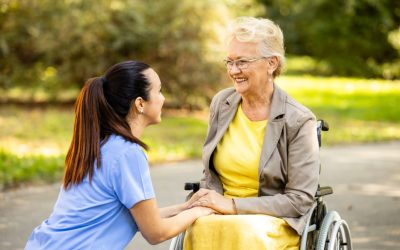Emergency preparedness for seniors is undeniably crucial. As our loved ones age, their vulnerability during emergencies increases. Our responsibility is to ensure they have a personalized emergency plan to mitigate risks and provide them with security and peace of mind.
Understanding the Unique Needs of Seniors
When considering a plan for emergency preparedness for seniors, it’s crucial to consider their specific needs and limitations. Physical limitations, such as mobility challenges or vision loss, must be considered when planning. Additionally, those who are under specialized care, such as dementia care and palliative care, may require focused care to ensure their well-being in emergencies.
Assessing Potential Risks and Hazards
The first step in creating a personalized emergency plan for seniors receiving home care is to assess potential risks and hazards in their surroundings. Conduct a thorough evaluation of their home environment to identify any safety hazards that must be addressed. Awareness of the specific disaster risks, such as earthquakes, hurricanes, or wildfires, in their local area is also crucial. Understanding climate-specific considerations allows for more targeted emergency preparations.
Establishing a Support Network
Seniors need a reliable support network in times of emergency; thus, establishing it is also essential in emergency preparedness for seniors. Identify family members, friends, or neighbours who can serve as emergency contacts and provide assistance when needed. Additionally, connect with community support services available to help seniors during emergencies. These services may include local senior centers, volunteer organizations, or medical support programs. Keep contact information easily accessible, both in physical and digital formats.
Preparing a Personalized Emergency Kit
A well-stocked emergency kit is essential for your emergency preparedness for seniors. As you assemble supplies, take into consideration their specific needs. Ensure an ample supply of medications and any necessary medical equipment. Remember personal hygiene supplies, such as hand sanitizer, wipes, and adult diapers if necessary. Non-perishable food and water should be included, considering dietary restrictions or special dietary needs. Keep important documents, such as medical records and identification, in a waterproof, easily accessible container. Additionally, make sure to include any mobility aids or assistive devices that are critical for their safety.
Creating an Emergency Communication Plan
Clear and timely communication is paramount, especially in critical situations, throughout the course of private home care. Establish a primary method of communication with your senior loved ones, whether it’s a mobile phone, landline, or other means of contact. Encourage them to keep their phone charged and easily accessible at all times. Additionally, consider utilizing technology-based communication channels like social media, video calls, or emergency alert apps. Designate a meeting point or shelter location where you can gather as a family in case of evacuation or separation.
Regular Practice and Review
Your plan for emergency preparedness for seniors is only effective if it is regularly practiced and reviewed. Conduct emergency drills and simulations with your senior loved ones to ensure they understand their role and feel confident in their abilities. Regularly update contact information and emergency kits to reflect changes in health conditions or support network contacts. Modify the plan as needed based on changing circumstances or additional needs that arise.
Emergency preparedness for seniors is a critical aspect of senior home care. By creating a personalized plan tailored to their unique needs and limitations, we can significantly mitigate risks and provide them with a sense of security. The peace of mind gained from knowing they have an emergency plan is invaluable. Let’s take action today and ensure the safety and well-being of our seniors during emergencies.
Aside from emergency preparedness, it’s important to consider if your loved ones may benefit from the support of a caregiver. If you’re uncertain about their needs, you can reach out to a senior home care agency in Victoria and Sidney, BC. They can provide an assessment to help determine the level of care that would best suit your loved one’s unique requirements. This proactive step ensures they receive the attention and assistance they deserve.
Latest Posts
Continuity of Care: The Key to Safer, Happier Senior Living
Continuity of care in senior living helps seniors feel safe, supported, and happier every day. As needs change with age, consistent, relationship-based support becomes not only helpful but essential to maintaining stability and quality of life. This guide explores the...
How 24-Hour Care for Seniors Supports Aging in Place with Dignity
For many older adults, 24-hour care for seniors fulfills a deeply personal wish—to remain at home as they age. Surrounded by familiar spaces, community connections, and a sense of independence, seniors can continue living with comfort and confidence. Yet, as daily...
Hospital to Home: Your Family’s Complete Senior Care Guide
A smooth and safe recovery starts with the proper preparation, clear guidance, and reliable home care support in Victoria and across BC. Whether your loved one is returning home after surgery, illness, or injury, this guide will help you plan every step of the...
Home Care Options in Victoria for Seniors with Limited Mobility
As seniors age, limited mobility can become a daily challenge—whether from arthritis, injury recovery, or chronic health conditions. For families in Victoria, finding the right kind of support is crucial to maintaining independence, safety, and overall quality of...
Your Family’s Role in Senior Home Care in Victoria
Caring for an aging loved one is never a one-person job. Families often turn to senior home care services in Victoria, BC, to ensure they receive professional support while still staying connected to the people who matter most. The right balance between family...
ADLs for Seniors: A Family Guide to Daily Living and Care
Caring for an aging loved one often means paying close attention to their everyday routines. ADLs for seniors, or Activities of Daily Living, are the essential tasks—such as bathing, eating, and dressing—that support independence and quality of life. When these become...
Affordable Senior Care in BC: A Better Way to Support Your Loved Ones
Affordable senior care in BC is a crucial consideration when caring for an aging parent or grandparent. Many families want their loved ones to remain at home where they feel comfortable and secure, but finding the proper support can be overwhelming. The good news is...
Compassionate Care for Seniors: Why It Matters
When it comes to caregiving, compassionate care for seniors goes far beyond helping with daily tasks. It’s about truly seeing the person behind the age—honouring their experiences, respecting their independence, and providing comfort in ways that matter. In both...
How to Do Caregiver Background Checks in BC on Your Own: A Guide for Families
Hiring someone to care for a loved one is a big step—one that requires trust, time, and a sense of security. Whether you’re working with an agency or hiring independently, doing your caregiver background checks in BC can give you peace of mind. With the right...











